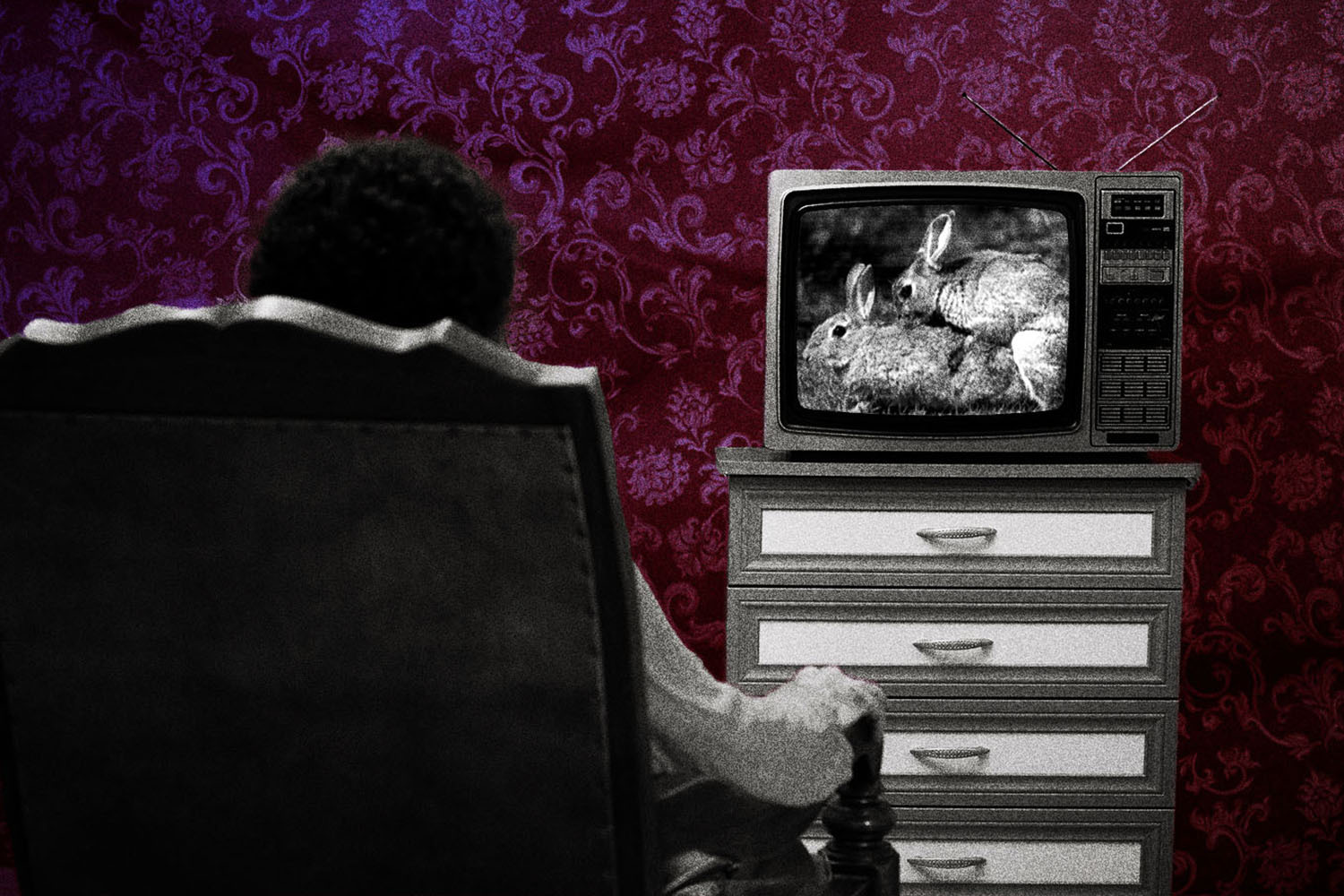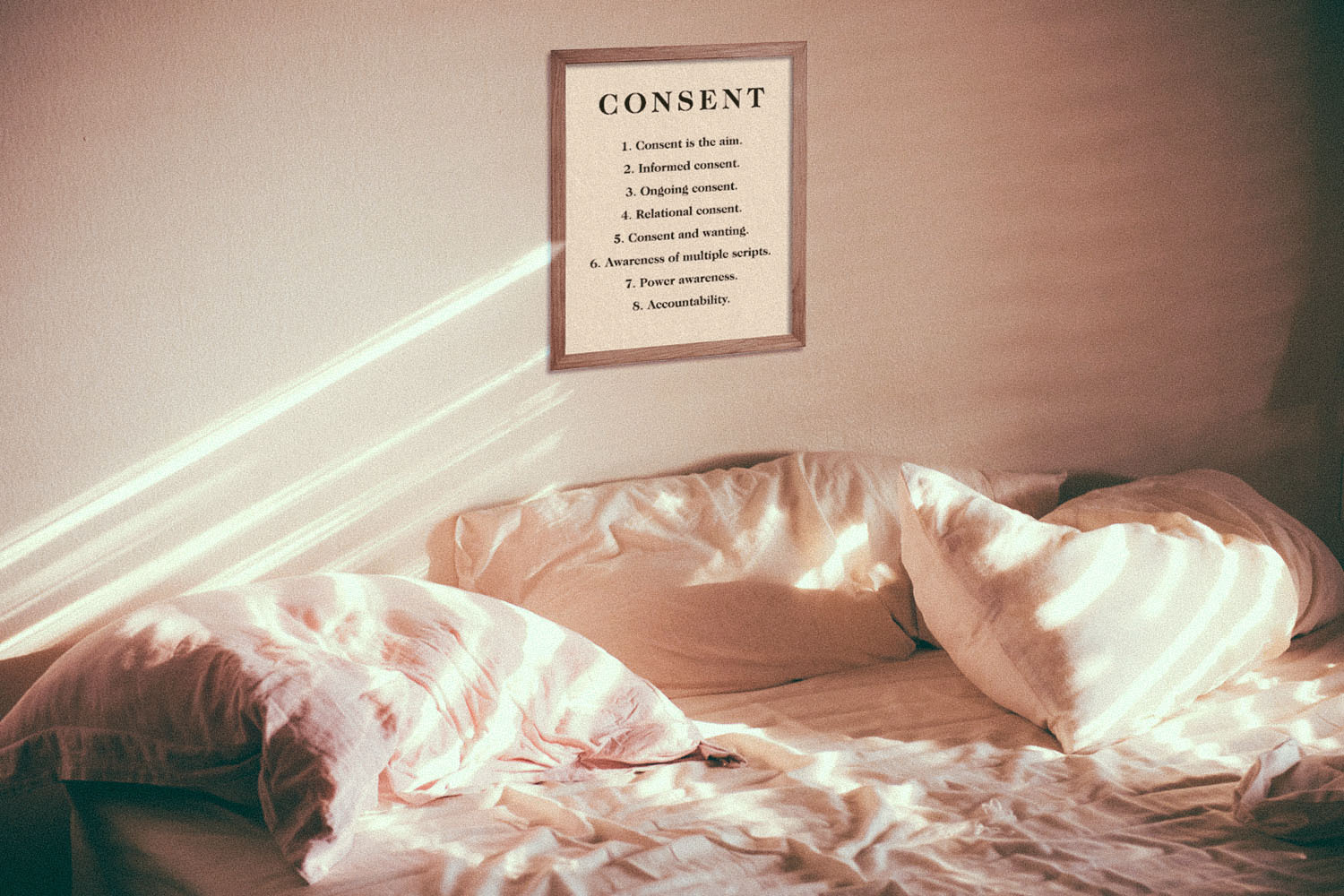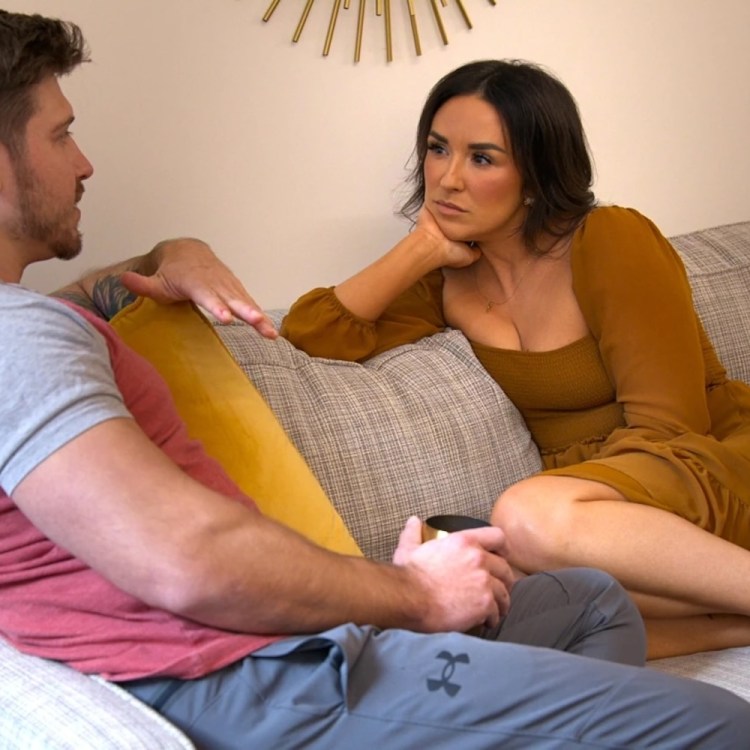According to a slew of surveys conducted over the last decade, at least 80 percent of men and 30 percent of women in America either fantasize about or want to try a threesome. Thanks to about 20 years of increasingly frank and frequent public discourse and pop culture depictions of ménages à trois, talking about this once taboo desire is no longer seen as outré and extreme. In fact, some sex researchers believe that threesomes have officially gone full-on mainstream.
Yet despite the ubiquity and acceptability of the fantasy, these same surveys suggest only about 10 to 25 percent of people have actually tried a threesome. In one major (pre-pandemic) survey, only three percent of respondents had participated in a threesome within the previous year — and only one percent within the previous month. And in another less rigorous but still telling survey, half of everyone who claimed they’d experienced a threesome said they didn’t plan to try another.
This clear gap between desire and reality stems from several distinct phenomena: many people are daunted by the sheer logistics of setting up a threesome — finding partners, broaching the idea for the first time, paying attention to not just one but two other people during sex, and so on. Some recognize that their fantasies, often informed by porn, are just that: fantastical daydreams that won’t translate to reality. Often, people have one threesome just for the sake of exploration, find it isn’t for them, and move on. Just as often, people jump into threesomes purely because they think that it’ll save a faltering relationship, have a bad time, and swear them off for life.
However, perhaps one of the greatest barriers to people’s pursuit of threesomes is the specter of jealousy: Even people who know what they want out of tripartite trysts often rule them out primarily because they either worry or know that they’ll feel jealous of the attention someone else gets in the mix, and aren’t willing or able to deal with that. People with an established partner especially tend to fear that threesome-born jealousy will slowly erode their relationship. Lifestyle blogs and tabloids love to run stories of nightmare experiences and post-threesome breakups rooted in ugly, obvious and unaddressed jealousy — even among those who expected the green-eyed monster to show up and thought they could deal with it.
Responding to popular interest in and anxieties around threesomes, countless publications have put together guides to navigating this unique sex act, often informed by interviews with sex therapists or people with plenty of threesome experience. There’s even a Master Class on the topic. But most of them dwell on how to arrange a threesome logistically — down to details like making sure your bed is big enough for three — and how to figure out what everyone involved wants out of the experience and how to pursue those likely diverse goals simultaneously. Few touch on jealousy at all, and those that do often skim over the subject piecemeal: noting the emotion often comes on unexpectedly, voicing a few platitudes about the general importance of communication, or just referring folks to other resources on how to manage jealousy in general.
Not to mention, the handful of guides that dig into the nitty-gritty of threesome jealousy often contradict each other. Some argue jealousy is inevitable but manageable, while others claim jealousy only emerges as a result of social conditioning or personal circumstances — and that those who are especially prone to jealousy might want to rethink their interest in threesomes. Most guides argue that clear pre-game communication and expectation-setting can mitigate or evade most jealousy, but a few prominent how-tos suggest that over-planning threesomes is the worst thing you can do. The vast majority of guides also consider jealousy exclusively through the eyes of hetero couples who bring a third party into their sex life, without ever considering how jealousy might crop up for that “unicorn,” or among three single people who choose to sleep together.
The lack of accessible and reliable information about the risks of threesome-linked jealousy and how to handle it dissuades too many people from exploring their sexual interests. Fortunately, over the last few years, a handful of researchers have started to direct dedicated attention to this topic.
InsideHook reached out to four of these specialists. Ashley Thompson of the University of Minnesota-Duluth’s Sexuality and Relationship Science Lab, who’s authored several studies on how people manage threesomes. Kathy Labriola, a nurse and counselor who’s published a workbook on how to navigate jealousy in non-monogamous contexts. Ryan Scoats, a sociologist at Coventry University who may have earned the first ever PhD in threesome studies. And Stella Harris, an intimacy educator who researched and wrote The Ultimate Guide to Threesomes. Below, they share their unique insights on when and why jealousy rears its head before, during or after threesomes; what people get wrong about threesome jealousy and how to manage it.
Stella Harris: Jealousy is an umbrella term for a variety of different feelings: Envy, insecurity, and feeling left out can all be a part of what people mean when they say they feel jealous.
Ryan Scoats: Yeah, I’ve observed three types of jealousy. One is exclusion. Feeling you’re not getting enough attention physically or emotionally, like the other two people in the threesome are just focusing on each other — like you’re not as desired. A second is based on feeling like the other people in a threesome are enjoying themselves but you are not, at least on some level. So, you feel not excluded, but like a third wheel. A third, related form of jealousy comes from the worry that you’re not as attractive as the other people involved — and if your partner is involved, that they might be more attracted to the third person, and could even run off with them.
Kathy Labriola: Usually, someone feels excluded to some extent during a threesome, for some amount of time. The feeling rotates from person to person throughout the experience.
Harris: Pinning down what you’re feeling specifically is important. That informs what actions you can take, or what requests you can make of your partners, to address your specific jealousy.
For example, if you’re watching the other two people in a threesome doing something that looks fun and sexy but you’re not a part of it, you might have a pang of an emotion that you recognize as jealousy. If you can identify that feeling as rooted in being left out, that suggests ways to manage the emotion. You could ask to join in on what they’re doing, or switch to a new activity.
Labriola: People often don’t do that. Instead, they sulk and withdraw somewhat in the moment.
Are some types of jealousy more common in certain threesome contexts than others? Like, are there specific forms of jealousy specific to threesomes that involve a dedicated couple? Or that show up more often in threesomes that involve one gender mix versus another?
Scoats: Generally, there is more to be jealous about, essentially, when you’re part of a couple that decides to have a threesome. Three single people may not have a lot invested in one threesome. If it goes poorly, you’ve had the experience and perhaps it’ll make a good anecdote and you can often walk away. But if you’re part of a couple, you’re going to be reminded of any type of bad feelings that might have come out of one threesome frequently, if not every day.
For heterosexual couples, jealousy is also more likely in an MMF threesome, because a man may be culturally primed to see a greater threat to a relationship from another man. If a woman in a heterosexual couple is bisexual and they have a FFM threesome with another bisexual female partner, the man might see that woman as a threat to the relationship as well. It really depends on the potential for attraction between one member of a relationship and a third party, and the level of perceived risk that the other of a couple may feel based on that potential attraction.
Labriola: A wife may likewise get jealous seeing her husband with another woman. That sort of jealousy is often based on comparison — one partner comparing themselves to another partner and feeling inadequate, which in turn creates feelings of relationship insecurity.
Most conversations about threesome jealousy do focus on couples who bring a third person into their sex life. So, let’s talk about experiences of jealousy among third parties, or among people who are all single. What can lead to jealousy for those folks, and is it unique?
Harris: Jealousy can happen to anyone.
Scoats: A couple has usually been together for some amount of time before they decide to try a threesome, so there’s a higher chance they’ve talked about their fears and concerns. They’ve had more opportunities to prepare. So, while there’s theoretically greater risk for them, there’s also greater opportunity to mitigate that risk than there is for a third, or three unrelated people.
Harris: A unicorn could feel jealous of the connection they see between an established couple, especially if they’ve set boundaries that keep the unicorn outside of that connection. People with no pre-existing relationships can feel jealous, for example, of each other’s looks or sexual skills.
Labriola: Especially if a couple goes home together and the outside partner is single and goes home alone, they may end up feeling ‘used’ by the couple — that they were expendable to them. If anything goes wrong, they are the ones discarded while the couple still have each other.
Scoats: Sometimes, two people are just going to be more interested in each other than a third even when they’re all relative strangers. Those two may even wish the third person was not there. There can definitely be jealousy related to a sense of exclusion in that context.
What do you make of the argument that threesome jealousy is natural or inevitable?
Harris: It’s not inevitable, but it’s certainly common. And some people are more prone to jealousy than others. Some people have done more work before preparing for those feelings, too.
Scoats: While people argue that jealousy is a natural, biological response, if you look at research on swingers and people who engage in polyamorous relationships, although they may start off feeling some jealousy, oftentimes they get to a point where they no longer experience what they’d call jealousy. They can even eroticize jealousy. They might be happy for their partners to receive something nice like sexual pleasure from someone else. So, while feelings of jealousy are common they’re not inevitable, and they can also be changed into other emotions over time.
Ashley Thompson: My data actually suggests that jealousy when engaging in a threesome may not be as common as many people think. Over 80 percent of my recent 150-person sample of individuals with experience with threesomes alongside a partner indicated that they did not experience jealousy in their most recent threesome experiences with their current partners.
Some researchers argue that feelings associated with compersion [happiness when you see your partner experiencing pleasure with someone else, often defined as the opposite of jealousy] are more common amongst people who engage in threesomes. Interestingly, feelings of compersion are related to levels of relationship satisfaction. Relationships benefit from that feeling.
Labriola: Some people don’t feel any jealousy during threesomes, but they will still feel intense jealousy if their partner has a sexual experience with the same person who was involved a given threesome that doesn’t involve them as well. That experience may seem more intimate to them. Their partner may bond more emotionally with that person than they would in a threesome.
Harris: Experiencing jealousy is not necessarily a bad thing. It’s just one of the many emotions people feel. What’s important is handling it in a way that takes care of your needs while still being thoughtful of the needs and feelings of other people involved in a threesome experience.
Guides to threesomes usually claim that communication is the best tool for preparing for and dealing with any jealousy that may crop up during a threesome. But that’s a pretty broad prescription. What specific types of communication are most helpful in this effort?
Scoats: It’s hard to give overarching advice, because people’s experiences are so unique. But I’d say that it’s important to consider communication at three stages: Before, during, and after.
Before a threesome, everyone involved — not just a couple — can talk about their expectations. What are they looking to get out of the threesome? What sexual interactions will happen, and what are off the table? Does anyone have any rules about when or how orgasms can occur? Do you have a code word or signal to show that you’re not happy and need to pause or readjust? For couples especially, boundaries symbolically make the sex they have with their partners different from the sex they have with someone else in a threesome, which seems to help with jealousy.
During a threesome, I often hear about people who aren’t happy with something that’s happening but don’t feel like they can speak up to stop it. They may presume others will pick up on their nonverbal cues. But that doesn’t necessarily happen. There really needs to be strong and clear verbal communication between everyone involved if anything doesn’t feel quite right. Just keep checking in, and keep an eye out for cues. But don’t get carried away and start taking yourself out of the moment, worrying too much about what you or your partner are feeling. It’s a bit of a double-edged sword.
After a threesome, if any concerns or negative feelings come up, talk about them with your partners. Really dig down into where that fear or jealousy came from and what it means—get into the specifics as best you can. Some of your feelings may potentially be unfounded emotional reactions in the moment, and talking through them afterwards will help you get past them.
Thompson: One individual respondent in a recent study I launched said, “My wife usually has a hint of jealousy. But after each threesome, we go to bed together and have sex again with just the two of us, followed by ‘aftercare,’ me holding and caressing her and showing affection.”
I love that quote because it shows how couples can put procedures in place, informed by but also beyond communication, to mitigate jealousy that may come out of threesomes — particularly afterwards.
Regarding that double-edged sword, some threesome advice posts argue setting too many boundaries, or policing them too heavily for yourself or others, can ruin the mood during a threesome. What do you make of that argument? Is there such a thing as too many rules?
Thompson: In a recent study I launched on people’s most recent threesome experiences that involved their romantic partners, I discovered that people who indicated that they’d had more communication prior to the experience and discussed hard boundaries — most frequently related to kissing, consent and internal climaxing — also reported the most positive threesome outcomes.
Scoats: That said, people who have spontaneous threesomes can still have good outcomes. Some people have said that they don’t enjoy planning, talking things out before, as it ruins the spontaneity of the experience. If that’s going to give them a worse experience, is that a useful thing for them? It’s all down to the idiosyncrasies of the people engaged in a given threesome.
It’s important to remember that jealousy can arise independent of someone being at fault for crossing a boundary as well. It’s impossible to know and mitigate every trigger beforehand.
Is there any ideal threesome setup or dynamic that can help people avoid jealousy?
Harris: There’s no ideal threesome for avoiding jealousy. What helps is knowing your needs and desires, and being able to negotiate with the other people involved in a threesome clearly and in advance. What helps is everyone involved having done their own work both on this, and in knowing how to identify their feelings and handle the difficult ones when they come up.
Regardless of the relationships involved, or the context, the response to jealousy is the same: The person experiencing it needs to identify the root of that feeling and decide if it’s a problem for them to work on themselves, or if there’s a request they need to make of other people.
For example, if you’re feeling jealous of someone else’s looks, then you probably need to work on your confidence on your own. But if you’re jealous because the third person in a threesome is fawning all over that person, giving them lots of compliments, and you’re feeling left out or ignored, you can request an activity that would make you the center of attention for a while.
What do we still not understand about threesome jealousy and how to navigate it?
Scoats: We haven’t done enough research into people who don’t feel jealousy about threesomes, and how they reached that state. Cultures around swinging and polyamory have a lot of guidance and support networks — people discussing jealousy and how to manage it. But people who engage in threesomes are not necessarily involved in those communities. So, how are the people outside of those communities who have threesomes without jealousy navigating things?
Thompson: More research into compersion is needed. Most sex research focuses on risks and how to mitigate them, which ultimately limits our ability to enhance people’s sex lives. Investigating and learning how to promote behaviors that produce compersion would be useful.
The Charge will help you move better, think clearer and stay in the game longer. Subscribe to our wellness newsletter today.




























